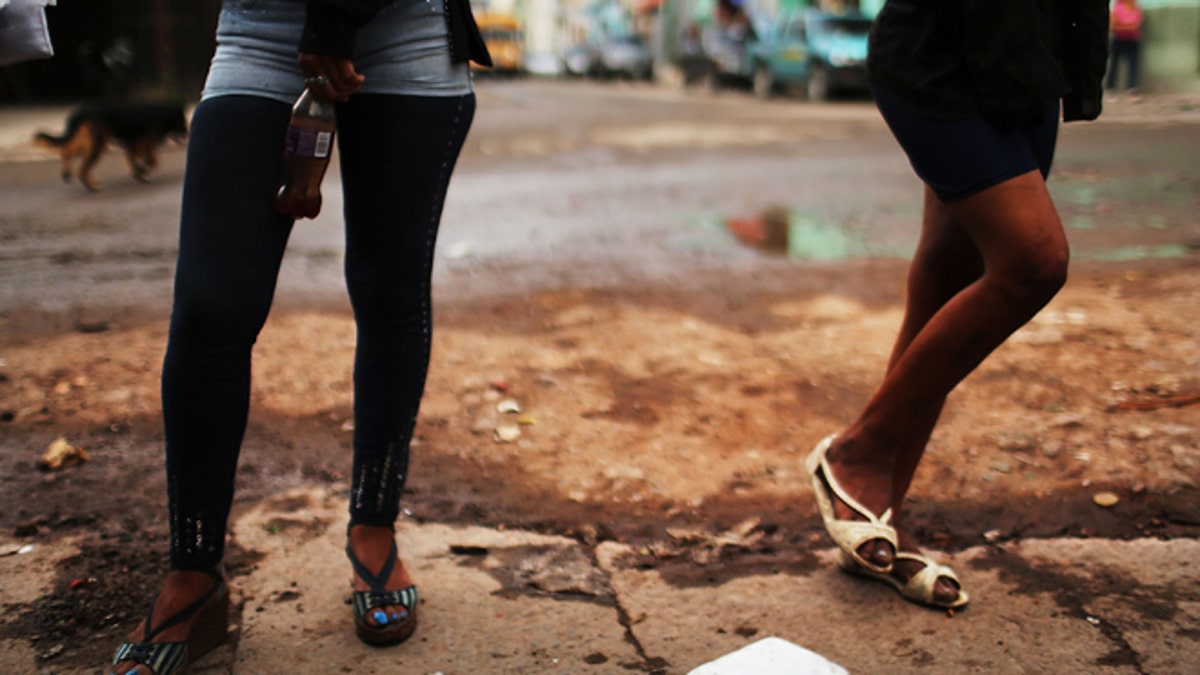
TEGUCIGALPA, HONDURAS - JULY 18: Sex workers wait for customers in a gang infested neighborhood on July 18, 2012 in Tegucigalpa, Honduras. Honduras now has the highest per capita murder rate in the world and its capital city, Tegucigalpa, is plagued by violence, poverty, homelessness and sexual assaults. With an estimated 80% of the cocaine entering the United States now being trans-shipped through Honduras, the violence on the streets is a spillover from the ramped rise in narco-trafficking. The non-governmental organization Doctors Without Borders has set up a program in the capital that looks to provide medical and psychological care to the homeless population. Each day a team goes out into the streets to meet with vulnerable groups of homeless to assess their needs. (Photo by Spencer Platt/Getty Images) (2012 Getty Images)
At the age of 12, Karla Jacinto thought that she had met her dream man.
He was older than her and from a faraway village called Tenancingo, but he bought her clothes and shoes and told her she was going to be a princess. It all seemed like a fairy tale, until one day, it turned into a nightmare.
Jacinto's boyfriend turned out to be a pimp working as part of an international organized crime ring, and he forced her into a life of prostitution and violence.
"He started punching me with his fists, kicking me, pulling my hair," she said, according to CNN. "He would spit in my face. That day he even burned me with the iron."
For the next four years, Jacinto was pimped out across Mexico – without a day's respite – and was told by her pimp that she had to service 30 men a day and keep a log of her clients. By the time she was 16, she said she was raped more than 43,200 times.
"There were men who would go just to laugh at me," said Jacinto, now a human trafficking activist. "They laughed when I cried."
Jacinto's story is horrible, but it is not uncommon, activists say, especially in Tenancingo – a town whose main industry is churning out pimps to exploit young women from across Mexico.
"We've been told by the traffickers themselves and by the girls that this town raises pimps," said Susan Coppedge, the U.S. State Department's ambassador-at-large to combat human trafficking. "That's what they've done for generations. That's what the town does. That is their industry. And yet in smaller, rural communities around there, the young girls don't have any idea that this is what the town's reputation is."
The town's infamy has even spread to the United States, where pimps living in New York and New Jersey have set-up makeshift brothels in vinyl-sided houses and rundown farmhouses.
The sex-trafficking pipeline began in Tenancingo and flowed to the New York City neighborhood of Jackson Heights in Queens. From there young girls and women are moved to ramshackle bordellos in places like Yonkers and Poughkeepsie.
'It is dangerous when they are trafficked out of town — we've had clients beaten up by buyers, raped by buyers — and they are in an unknown location. So they are isolated," Lori Cohen, a lawyer with the nonprofit Sanctuary for Families, told the New York Daily News.
In a six month period between Otober 2012 and May 2013, Immigration and Customs Enforcement agents arrested 33 people on sex trafficking charges from the Tenancingo area.
Coppedge, who previously worked at the U.S. Attorney's Office in Atlanta, said that Tenancingo's trafficking tentacles have also reached that city as well.
Globally two million children are exploited in the sex trafficking trade, with a mixture violence, corruption, fear and shame are major factors in preventing them from trying to escape.
"You see me now with a smile on my face, but when I think about that, it still hurts a lot," Jacinto told CNN. "I'm going to fight against this until the very end. Every day when I wake up, I wonder if I'm going to be alive at the end of the day because of what we do. And what we do makes me a target. Death is lurking."
